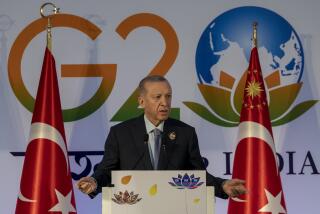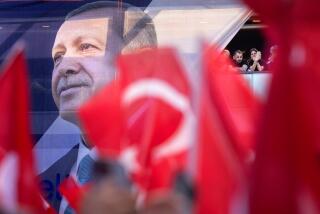Turkish Leader’s U.S. Visit Will Focus on Repairing Ties
- Share via
WASHINGTON — The prime minister of Turkey, Recep Tayyip Erdogan, arrives here today for meetings with President Bush and other officials aimed at repairing relations seriously damaged by differences over the Iraq war and other issues.
Both sides have made gestures in recent weeks to indicate their interest in returning to the kind of strategic cooperation that once characterized the partnership between the two NATO allies. But significant friction remains.
The Bush administration is expected to press Erdogan to curb his government’s ties with Syria and Iran and encourage him to move ahead with democratic reforms necessary for membership in the European Union. The Turkish leader is expected to demand that the U.S. crack down on Kurdish guerrillas staging attacks in Turkey from northern Iraq.
Erdogan will visit with Bush at the White House for about an hour Wednesday; Turkish officials said the prime minister had requested a lunch, and saw the briefer schedule as something of a snub. A National Security Council official refused to comment on the schedule.
Still, both sides emphasized the meeting as an important step in righting the troubled relationship.
“Nobody even expected the meeting to take place, so the fact that it is is a sign that relations are improving,” said Soli Ozel, an expert in international relations at Istanbul’s Bilgi University. “The best way forward for the relationship is for both sides to be honest and clear with each other [and] to redefine the framework of the relationship on a realistic basis.... There should be more dialogue and less recrimination.”
A U.S. official here also expressed optimism.
“We’re seeing signs that U.S.-Turkish relations are beginning to come out of a bad period,” said the official, who spoke on condition of anonymity. “The first goal is to see if we can use this visit to get some momentum and get bilateral relations back on a solid track.”
Relations between the two nations soured most dramatically over the war in Iraq.
Many Bush administration officials have not forgiven Turkey for its March 2003 parliamentary decision to deny U.S. forces access to Turkish soil to invade Iraq from the north.
As recently as this spring, Defense Secretary Donald H. Rumsfeld criticized the move, saying the Americans’ inability to invade from the north had allowed Saddam Hussein’s forces to melt away and then regroup as the insurgency.
Partly as a consequence of that, U.S. officials have said, American military forces are too busy and don’t have sufficient personnel to take on Kurdish guerrillas staging attacks in Turkey from northern Iraq.
That issue is one of the most critical to Erdogan.
Ankara is increasingly angry and nervous over mounting violence by guerrillas of the Kurdistan Workers Party, or PKK, a separatist organization that Washington has branded a terrorist group.
The Turkish military says that in the 12 months that ended Wednesday, 107 people were killed and 231 injured in PKK attacks, compared with only five deaths in the corresponding period the year before. Four more soldiers and officers were killed in a rebel ambush over the weekend, Turkish authorities said.
U.S. officials and politicians have also expressed concern about Turkish overtures to governments Washington does not like, such as Syria and Iran, and over a rising tide of anti-Americanism in Turkey fueled by U.S. abuse of Iraqi prisoners and other incidents.
Rep. Robert Wexler (D-Fla.) met with Erdogan last month in Ankara and later said he raised the issue of several high-level Turkish delegations to Damascus, including one by President Ahmet Necdet Sezer, even as Washington was attempting to isolate the Syrian regime.
“What we would hope and we would expect of our allies ... is that there be a united front presented to authoritarian leaders such as [Syrian President] Bashar Assad, so that Bashar Assad can see no light of day between the United States and Turkey,” Wexler told the Turkish newspaper Sabah. “Turkey needs to assert herself in a manner in this region which advances the cause of democracy.”
Erdogan has often found himself caught between the agendas of those who want Turkey to follow a path of pro-Western reform and more nationalistic and conservative forces, some of which counsel that Turkey’s future is with the Muslim world, not Europe or the U.S.
Consequently, Erdogan -- a former Islamist who has maintained a decidedly secular state -- paid a high-profile visit to Israel last month, but also has made no bones about cultivating ties to Iran. Scandals such as the prison abuse at Abu Ghraib at times made support for Washington difficult to defend, especially to his most conservative Islamic base.
On the positive side, U.S. and Turkish officials say, Turkey recently agreed to expanded American use of the Incirlik air base for logistical operations in Afghanistan and Iraq. Turkey is now commanding a North Atlantic Treaty Organization peacekeeping mission in Afghanistan for the second time, and is training Iraqi police and politicians in Turkey.
Turkey has also started to speak more frequently of cooperation on Iraq and recently endorsed federalism as a governing model for that country, if Iraqis desired it. Such a system could give Iraqi Kurds significant autonomy, something Ankara has long feared as it has grappled with its own Kurdish minority’s aspirations for self-rule.
“The U.S.-Turkish relationship is one of the main axes of our foreign policy,” Erdogan recently told parliament, in his most unequivocal affirmation to date of the partnership.
In addition to his White House visit, Erdogan will travel to New York on Thursday for a lunch with U.N. Secretary-General Kofi Annan to discuss Cyprus. Erdogan was delighted by a recent visit of U.S. congressmen to the Turkish-occupied northern section of the divided island, a gesture he saw as tacit recognition. Most of the world only recognizes the Greek-backed southern portion of Cyprus.
Erdogan has said he will ask Bush for support in ending the isolation of Turkish Cypriots. A proposed settlement to the 31-year-old conflict, backed by Annan, was endorsed by Turkish Cypriots in a referendum last year, but was rejected by Greek Cypriots.
During the meeting with Bush, Erdogan will probably seek continuing assurances of U.S. support for Ankara’s bid to join the EU.
The Bush administration is expected to urge Erdogan to stay the course in pursuing reforms to make Turkey more attractive to the Europeans. Some voters in France and the Netherlands, as well as citizens of other EU countries including Germany, have expressed reluctance at membership for a relatively poor, mostly Muslim country like Turkey.
The U.S. official who spoke ahead of the Erdogan trip said Washington would “remind the Turks that they need to consider their best strategy, and the best thing to do is stay one step ahead of the demands of the EU” for internal reforms.
*
Wilkinson reported from Rome and Efron from Washington. Staff writer Edwin Chen in Washington and special correspondent Amberin Zaman in Ankara contributed to this report.
More to Read
Sign up for Essential California
The most important California stories and recommendations in your inbox every morning.
You may occasionally receive promotional content from the Los Angeles Times.











